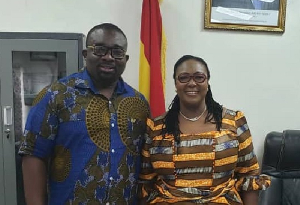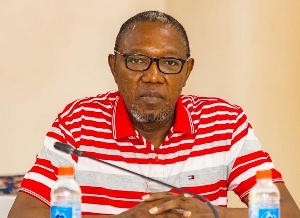Opinions of Sunday, 19 November 2023
Columnist: Cameron Duodu
We must summon Ghana’s ancestral spirit to defeat Galamsey
I’ve been watching a video of spectacular interest. It was filmed in 2017, during a visit to Otumfuo Osei Tutu The Second made to Tachiman and Nkoranza. (See Youtube: Asantehene visits Tachiman and Nkoranza).
The video is remarkable because it provides first-hand evidence that our inherited culture is alive and very well.
Anyone watching the video who has a deep understanding of our society (I am of necessity limiting the scope of this discussion to what I know about, first-hand) will notice that there was a great deal of overt emotional expression in the welcome ceremonies that honoured the Otumfuo’s visit to the two towns.
The people turned out in their thousands to [sebe o tafrakyer] remind the King of Asante that there were “issues” from the past arising from incidents that arose between Asante and the Tachiman and Nkoranza nations, that they still remembered with some bitterness. But he was in their midst, and they welcomed him with open arms. Any remnants of past misunderstandings would be discussed “between friends.”
There was one particular group of Tachiman singers and drummers whose demeanor seemed slightly threatening. But as they pointed their fingers and mouthed words that were challenging, the Otumfuo smiled. One does not get named after Osei Tutu and frets when others remember what Osei Tutu once did to them!
This resilience and practical approach to life is what preserved our societies during the years when assaults by foreign powers nearly destroyed Africa. Enemies today, friends tomorrow was the motto of many empires. Our people exhibited a desire to do everything necessary (including the swallowing of petty “pride”) to ensure the survival of their societies.
This brings me to my current most unanswerable question: how can a people who had undergone so much hardship in the past and emerged triumphant, allow, today, a small group of miscreants in their midst to threaten the future life of the nation they had built at such great cost in blood and hardship`? Are these the same people who could, once, impose severe measures on their society to save the populace from such contagious diseases as smallpox and yaws?
What modern Ghanaian society has done is to perpetrate a horrible trick on our traditional system of government. An over-centralized government has assumed total responsibility for our national security and our economy, without being able, at the same time, to eliminate the corruption and incompetence that the over-centralisation of administration usually brings.
If our central government had allowed our chiefs to organize their towns and villages to defend their territory against galamseyers, the horrendous calamity facing the nation could not have arisen. Instead, the central government organized the districts in the untested way it wanted to do and then invited the chiefs to cooperate with the district administrations.
No one lifts a finger against the central government without anticipating consequences of a very serious nature. So, the chiefs quietly said goodbye to local administration and left the district administrations to be as corrupt as they could be.
Meanwhile, the central government should be policing the district administrations and preventing corruption from doing nothing; (usually because of party political reasons.) This has created a situation whereby in many parts of the country, administrative laissez-faire is the rule of thumb.
It is not too late for the National House of Chiefs, in concert with the Council of State, to bring tremendous pressure on the Central Government to devolve powers back to the palaces of the chiefs. The condition the Central Government should insist upon is that the chiefs allow “local democracy” to be brought back to their administrations, through the supervised reincarnation of the ASAFO group back into the affairs of every palace.
Each chief already possesses, through the LOCAL ASAFO TRADITION, enough skill in his township or village to be able to organize small militarised groups to waylay galamsey gangs as and when necessary, to prevent the galamseyers going into streams and rivers in search of gold. New laws must be enacted to STOP THE POLLUTING OF RIVERS AND STREAMS. IT SHOULD ALSO BE UNLAWFUL TO BLOCK THE PATHS USED BY FOOD AND COCOA FARMERS TO GO TO THEIR FARMS.
We have a proverb that advises us to “San kofa” (Go back to fetch the variables you have left behind.) We should therefore not hesitate to use every traditional method we know of, to stop the galamsey operators from destroying our water-bodies; rivers; streams; farmlands, and even sacred graveyards.
Almost everyone in Ghana has heard of the “Deer-hunt” festival of the Effutu people, which takes place at Winneba almost every year [usually around May].
At this festival, MACHISMO [the display of manly valour is the order of the day. Two “Asafo” groups vie with each other to go into the bush and capture – a LIVE deer with their bare hands. The Winneba “Asafo” groups are called the TUAFO and the DENTSEFO.
The tradition is hundreds of years old. But it still works every year. The least we can do is to do a quick scientific study of how it has managed to last, and adopt its methods, to prevent our children and their children from inheriting a Ghana in which all the water has been poisoned for gold.
If we fail in this sacred duty, generations unborn will come to curse us and defecate on our graves. And they would be justified.













